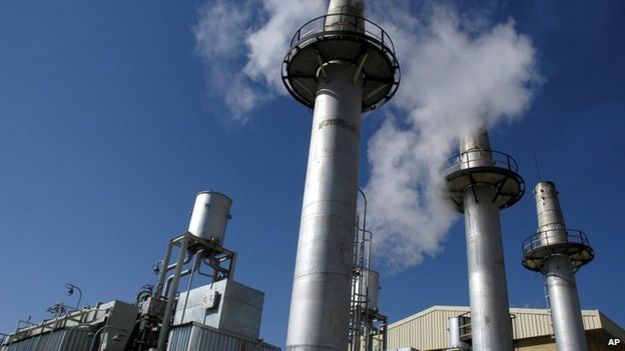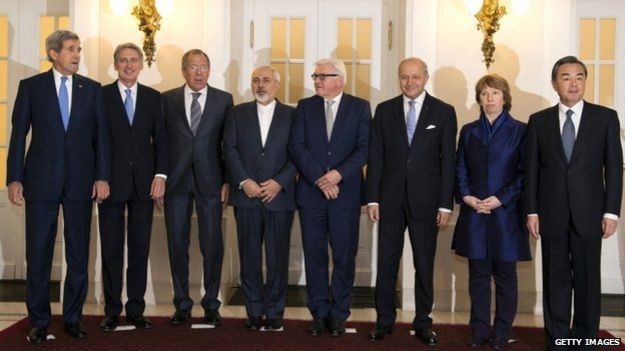Iran deal could start nuclear fuel race - Saudi Arabia
- 16 March 2015
- Middle East
A senior member of the Saudi royal family has warned that a deal on Iran's nuclear programme could prompt other regional states to develop atomic fuel.
Prince Turki al-Faisal told the BBC that Saudi Arabia would then seek the same right, as would other nations.
Six world powers are negotiating an agreement aimed at limiting Iran's nuclear activity but not ending it.
Critics have argued this would trigger a nuclear arms race in the region spurred on by Saudi-Iran rivalry.
"I've always said whatever comes out of these talks, we will want the same," said the prince, Saudi Arabia's former intelligence chief.
"So if Iran has the ability to enrich uranium to whatever level, it's not just Saudi Arabia that's going to ask for that.
"The whole world will be an open door to go that route without any inhibition, and that's my main objection to this P5+1 [the six world powers] process."

With a late March deadline for an Iran deal approaching, Saudi Arabia last week signed a nuclear co-operation agreement with South Korea that included a plan to study the feasibility of building two nuclear reactors in the kingdom.
Riyadh has also signed nuclear co-operation agreements with China, France and Argentina, and intends to construct 16 nuclear power reactors over the next 20 years.
The US Secretary of State, John Kerry, flew to Riyadh earlier this month to reassure Saudi Arabia and other Gulf Arab allies that America would not accept any deal unless it prevented Iran from building a nuclear weapon.
He was told that they found Iran's support for armed Shia Muslim groups in regional conflicts as troubling as the prospect of an atomic bomb.
"Iran is already a disruptive player in various scenes in the Arab world, whether it's Yemen, Syria, Iraq, Palestine, or Bahrain," said Prince Turki.
"So ending fear of developing weapons of mass destruction is not going to be the end of the troubles we're having with Iran."
Of most concern to Saudi Arabia is Iran's backing of Iraqi Shia militias in the fight against Islamic State (IS) militants.
That role has become more public during the battle over the Iraqi city of Tikrit, with General Qasem Soleimani, commander of the Iranian Revolutionary Guards' Quds Force, stepping out of the shadows to openly guide Shia forces.
"Now it seems that Iran is expanding its occupation of Iraq and that is unacceptable," said Prince Turki.
The Americans are trying to keep a delicate balance, recognising that the US and Iran share common cause, if not co-ordinated action, against IS.

The US military's top officer, Gen Martin Dempsey, has said that Iran's help in the Tikrit offensive could be "a positive thing" providing it does not fuel sectarianism.
But on a recent visit to Baghdad he expressed concern that Iraq's Shia political leaders were not taking promised action to bridge the sectarian divide with Sunni Muslim Arab tribes, and warned this could strain the anti-IS coalition of which Saudi Arabia is a member.
Riyadh has also long been frustrated with America's refusal to arm the Syrians against the government of President Bashar al-Assad, Iran's closest Arab ally.
So it has agreed to participate in a US-led programme to train and arm Syrian rebels even though the focus would be fighting IS, not Mr Assad.
"Inevitably I believe fighting [IS], or Fahesh as I prefer to call it, is fighting Assad," Prince Turki declared, using an Arabic word for obscene that rhymes with "Daesh", the Arabic acronym of the group's previous name Islamic State of Iraq and the Levant.
"It's because of Assad's treatment of his people that Fahesh has taken advantage of the situation… so the enemy is both Fahesh and Bashar al-Assad," the former Saudi intelligence chief added.


No comments:
Post a Comment